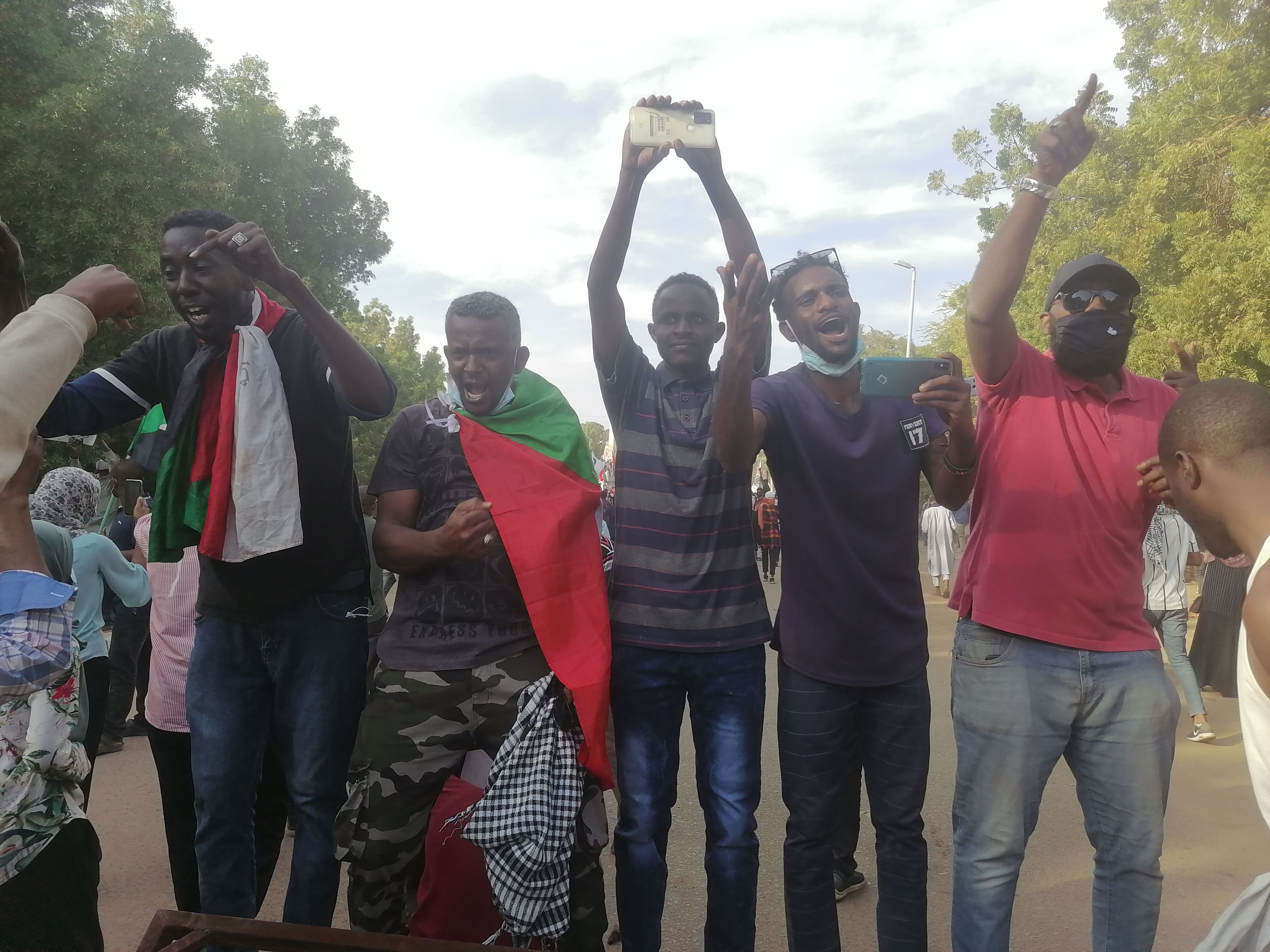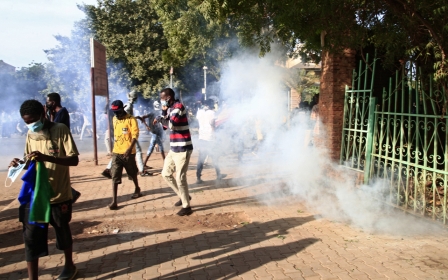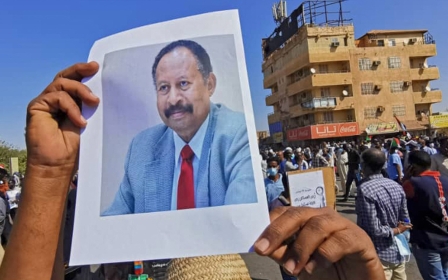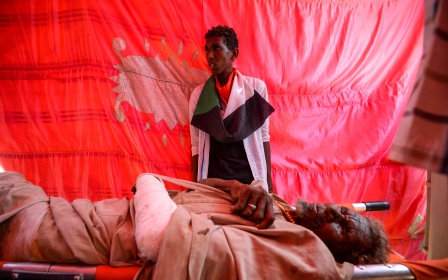Sudan: Hamdok 'may resign soon' as thousands march on presidential palace
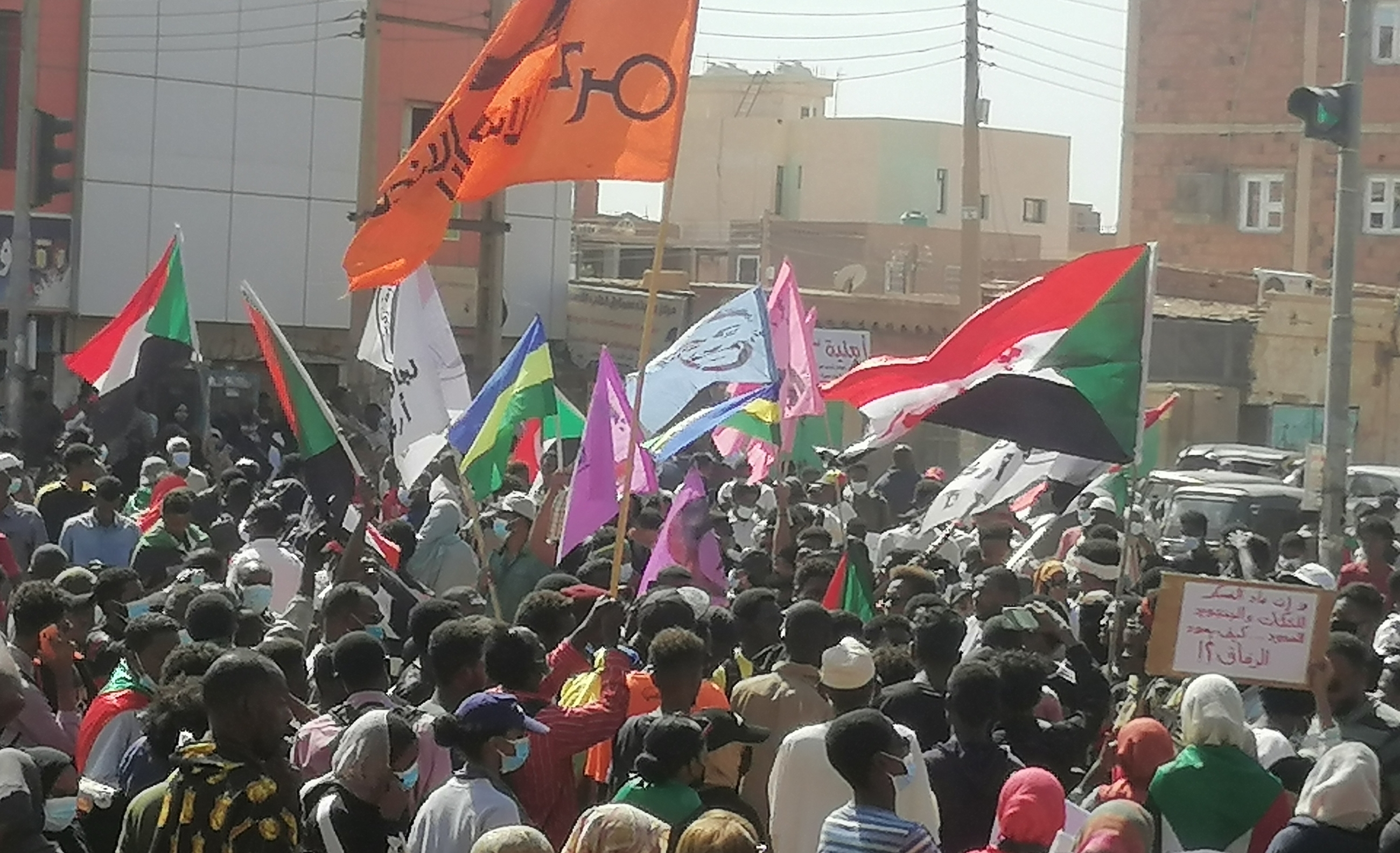
Thousands of people in Sudan took part in mass protests against military rule on Saturday despite disruptions to internet and phone services.
At least 178 protesters were wounded as security forces fired teargas and rubber bullets at them, the Central Doctors Committee said Saturday evening.
Meanwhile, sources told Middle East Eye that Prime Minister Abdallah Hamdok intends to withdraw from his 21 November power-sharing agreement with the army and quit his post amid continued violence by authorities against anti-coup protesters.
Thousands took part in protests in the streets of the capital, Khartoum, marching on the presidential palace with protesters raising Sudanese flags and calling on the military to "go back to the barracks". Organisers called it "a million-man march" and said it was planned to end at 5pm (15:00 GMT).
'The prime minister is very frustrated, especially after the repeat of using violence against protesters and the escalation measures of cutting the internet, phone calls and SMS messages'
- Sudanese source
Security forces fired teargas to disperse some protests, while internet and phone services were cut off.
New MEE newsletter: Jerusalem Dispatch
Sign up to get the latest insights and analysis on Israel-Palestine, alongside Turkey Unpacked and other MEE newsletters
The internet was previously cut off for one month after the 25 October coup, in which Sudan's army chief, Abdel Fattah al-Burhan, ousted the hybrid military-civilian government and briefly held Hamdok under house arrest.
Since then, civilian parties and activists have organised several mass protests rejecting dialogue or partnership with Burhan.
Even when Burhan reinstated Hamdok on 21 November in accordance with a deal promising elections in 2023, protests continued as many of the prime minister's supporters accused him of betraying the pro-democracy movement by providing legitimacy for the military coup leaders.
Security forces have confronted protests with violence, leading so far to the death of at least 48 people, according to the Doctors' Committee.
The Information and Communication Technology Syndicate warned against disrupting internet services on Friday, saying this would constitute "another crime and violation that would be added to other violations by the coup leaders" and that the move aims at "concealing [their] crimes".
According to Reuters, which cited a telecommunications network official, the disruption to the internet and phone services is based on a decision by the official National Telecommunication Corporation.
Translation: "The Khartoum march is one of the largest. It has a large number of people chanting powerfully. That shows us that the revolution continues and is getting stronger."
On Tuesday, Hamdok told political figures that he intended to resign amid the popular backlash against his deal with the army. The deal involved the release of political detainees and the formation of a technochratic cabinet.
On Saturday, two sources close to Hamdok told MEE on condition of anonymity that he still intended to resign "very soon".
"The prime minister is very frustrated, especially after the repeat of violence against protesters and the escalation measures of cutting the internet, phone calls and SMS messages," said one source.
The sources added that the premier attempted to resign two days ago but a number of politicians intervened, convincing him to backtrack.
"There are number of disputes between Hamdok and the military, and between him and the revolutionary movements over their participation in the cabinet," another source said, explaining that the participation of political forces in the upcoming cabinet violated the November agreement with the military.
'Cat-and-mouse' fight
Last Sunday, 19 December, witnessed a mass protest, estimated in the thousands, marking the third anniversary of the start of mass demonstrations that led to the overthrow of long-time president Omar al-Bashir.
Security forces cracked down on the protest, killing at least two people, while the UN said that it had documented 13 incidents of rape on 19 December alone.
'This cat-and-mouse street battle will end with the victory of the protesters or we will die in front of the palace'
- Abdul Halim Osman, protester
On Saturday, many protesters attempted to enter the palace, but police and the paramilitary Rapid Support Forces dispersed them using teargas and rubber bullets.
Eyewitnesses said "cat-and-mouse" street fighting broke out between security forces and protesters until late in the afternoon, with some protesters wounded in the violence.
Abdul Halim Osman, 45, said that the protesters intend to stage a sit-in in front of the presidential palace until they bring down the military headed by Burhan.
"This cat-and-mouse street battle will end with the victory of the protesters or we will die in front of the palace," he told MEE.
Another protester, Amar Hassan from Omdurman, said that thousands of protesters had crossed the bridge linking Khartoum and its twin city of Omdurman, joining the protesters in front of the palace.
Members of the Rapid Support Forces, police and other security elements have been intensively deployed in Khartoum since early on Saturday in anticipation of protests.
The forces closed the main roads and bridges as well as roads leading to the presidential palace, the centre of Khartoum and airport streets.
The SUNA state news agency reported that the province of Khartoum closed bridges on Friday evening.
"Departing from peacefulness, approaching and infringing on sovereign and strategic sites in central Khartoum is a violation of the laws," SUNA cited a provincial security coordination committee as saying.
"Chaos and abuses will be dealt with," it added.
Volker Perthes, the UN special envoy to Sudan, has urged the authorities to "protect" the protests.
"Freedom of expression is a human right," Perthes said on Saturday, adding that this includes "full access" to the internet. "No one should be arrested for his or her intention to protest peacefully."
Middle East Eye delivers independent and unrivalled coverage and analysis of the Middle East, North Africa and beyond. To learn more about republishing this content and the associated fees, please fill out this form. More about MEE can be found here.


